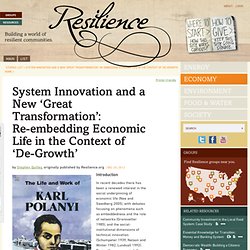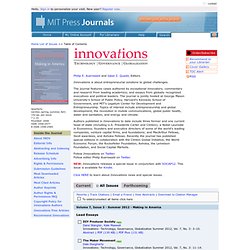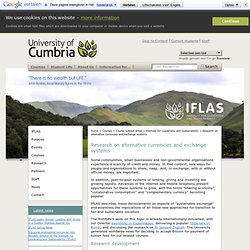

System Innovation and a New ‘Great Transformation’: Re-embedding Economic Life in the Context of ‘De-Growth’ Introduction In recent decades there has been a renewed interest in the social underpinning of economic life (Nee and Swedberg 2005), with debates focusing on phenomena such as embeddedness and the role of networks (Granovetter 1985), and the social-institutional dimensions of technical innovation (Schumpeter 1939, Nelson and Winter 1982, Lundvall 1992).

During the same period, the perceived failure of non-market alternatives to capitalism has resulted in a burgeoning interest in ‘responsible capitalism’ and the possibility of socializing market forces for a variety of social and ecological ends. Social entrepreneurship and social enterprise are seen as increasingly significant vehicles for social change, innovating new types of organisation and legal forms.
Such an interpretation both draws upon and lends credence to institutional-economic studies of innovation and sociological analyses of social capital. Polanyi’s (1944) account focused on developments in Great Britain. Innovations: Technology, Governance, Globalization. Philip E.

Auerswald and Iqbal Z. Quadir, Editors Innovations is about entrepreneurial solutions to global challenges. Six Operational Advantages of Worker Cooperatives. I am concerned that the economic advantages of organizing businesses as worker cooperatives are often forgotten, while idealistic goals often become the sole focus and motivation. Given the advantages available, worker cooperatives can be as competitive, if not more so, than any other type of business. What follows is an outline of these economic advantages. 1. Worker cooperatives can create jobs. At a time such as now, when jobs are hard to find, or exist only as a “take it or leave it” situation for the employee, a preferable alternative may be for people to create their jobs rather than trying to find them.
This is not to imply that the creation of a cooperative automatically solves the employment issues of its members. 2. There is an economic justification for worker cooperatives to exist even if they do not make a profit so long as they provide an economic benefit to their member-workers in the form of a salary. 3. Businesses operate on a profit margin. 4. 5. 6. Why mainstream community economic development? Because it works. Why mainstream community economic development? Because it works. March 7th, 2013 Localise West Midlands (LWM) has just completed some research which we wanted to share with those interested in the REconomy project.
It is closely related to REconomy thinking, and we hope (have to hope) it has potential to increase how “reconomics” can be integrated into mainstream economic development. The UK economy is one of the most centralised in Europe. Like REconomy, we see that this contributes to sustainable development through its social outcomes, its focus on community-scale economic power and resilience, meeting local needs through local enterprise, and reducing travel distances and dependence on cheap fossil fuels.
Realities of resource scarcity obviously cannot be divorced from social justice and wellbeing, or even from traditionally measured economic success, but as we all know this is still understood by few people. </b>*} 10 Practical Tools for Building a Resilient Local Economy. Research on alternative currencies and exchange systems. Some communities, small businesses and non-governmental organisations experience a scarcity of credit and money.

In that context, new ways for people and organisations to share, swap, rent, or exchange, with or without official money, are important. In addition, peer-to-peer systems of lending, giving and investing are growing rapidly. Advances in the internet and mobile telephony present opportunities for these systems to grow, with the terms "sharing economy", "collaborative consumption" and "complementary currency" becoming popular.
IFLAS describes these developments as aspects of "sustainable exchange" and examines the implications of all these new approaches for transition to fair and sustainable societies. The Institute’s work on this topic is already internationally renowned, with our Director keynoting in Copenhagen, delivering a popular TEDx talk in Rome, and discussing the research on Al Jazeera English. Research development IFLAS supervises doctoral studies on this theme.